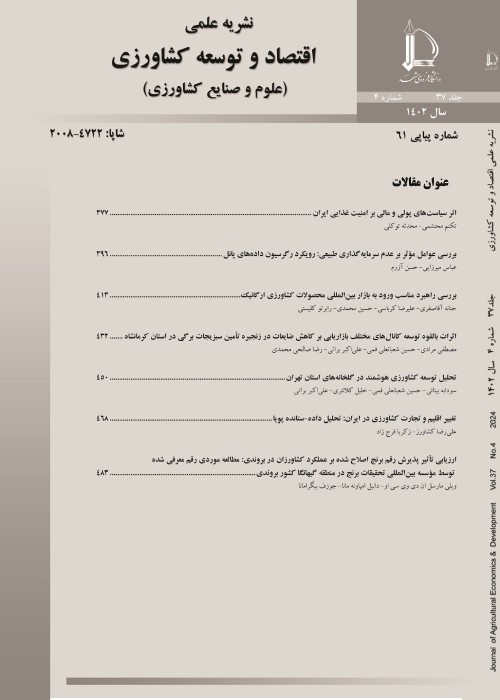The Impact of Some Economic Factors Affecting Groundwater Pollution in Both Developed and Developing Countries
The role of economic factors in pollution and environmental degradation is one of the major Issues in economic and environmental studies that many researchers have addressed in their studies. One of the issues in the field of environment to which less attention has been paid is the effect of economic factors such as the openness of the economy on water resource pollution. In this paper we investigate the relation between water pollution and economic factors such as economic size، capital to labor ratio and economic openness in two groups of developed and developing countries with paned data method. In fact we investigate the two hypothesis of Environmental Kuznets curve and pollution havens in two groups of countries. To prevent the pollution of groundwater resources in the process of economic growth، policies must be coordinated by responsible organizations. Changing crop patterns and moving toward the production of organic products to reduce the use of polluting substances in the production of agricultural products is one of these solutions.
In the present study، using panel data methods، the correlation between some independent economic factors such as per capita GDP، Squared per capita GDP that both indicate Scale effect and capital to labor index with Squared capital to labor index both indicating comparative advantage effect and openness of trade and some composite indices on dependent variables، groundwater pollution، in the two groups of countries both developed and developing countries has been investigated. For this purpose، using the biological oxygen demand index (BOD) as an indicator of pollution of groundwater resources and sum of exports and imports divided by GDP as an indicator of economic openness and GDP per capita as an indicator of the economy in the period of 1995 to 2006، the Environmental Kuznets curve and pollution havens hypothesis have been tested. Results
The issue of water pollution is important in the present century. Increasing population and increasing water demand in different sectors of agriculture، industry، drinking water and sanitation have caused great pressures on groundwater resources. The increasing demand for water and water pollution exacerbate water shortages in many parts of the world، including Iran. The results shows that in the group of developed countries، an increase in per capita income will reduce water pollution and further increases in per capita income have led to increasing pressure on water resources، and thus there will be more pollution. Also in developing countries، an increase in per capita income has increased pressure on water resources and water pollution، but in a subsequent step، the increase in per capita income can even lead to a reduction in pollution. In other words، the relationship between GDP per capita، and water pollution in developed countries has a U-shaped curve and in developing countries it has an inverted U-shaped curve. Therefore، the environmental Kuznets hypothesis has been confirmed in developing countries. Other the results showed that with increasing openness of the economy، pollution of water resources in developed countries remains unaffected، while in developing countries، water pollution will increase. Thus، the pollution haven hypothesis is also confirmed in developing countries. Other factors also have different effect in two groups of countries. Policies to avoid additional pressure on water resources in the process of economic growth and restrictive regulations for accumulation of pollutants in the industry along with the economic liberalization can find ways to prevent further contamination of water resources in developing countries، including Iran.
Due to the positive correlation between economic openness and contamination of underground water resources in developing countries including Iran on the one hand and requirements for joining the World Trade Organization (WTO) on the other hand، the government should set policies for controlling pollution on groundwater resources with relevant rules such as pollution tax on polluting agents in the process of globalization and trade openness. To prevent the pollution of groundwater resources in the process of economic growth، policies must be coordinated by responsible organizations. Changing crop patterns and moving toward the production of organic products to reduce the use of polluting substances is one of these solutions. Due to confirming pollution Haven Hypothesis in Developing countries such as Iran، It recommended that policies such as Increasing Tariffs on Pollutant Industries adopted by policy Makers in this countries.
- حق عضویت دریافتی صرف حمایت از نشریات عضو و نگهداری، تکمیل و توسعه مگیران میشود.
- پرداخت حق اشتراک و دانلود مقالات اجازه بازنشر آن در سایر رسانههای چاپی و دیجیتال را به کاربر نمیدهد.


